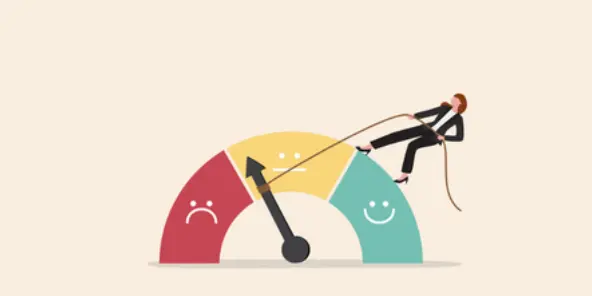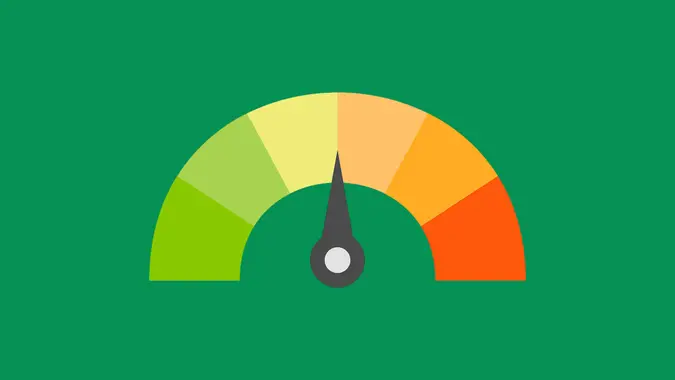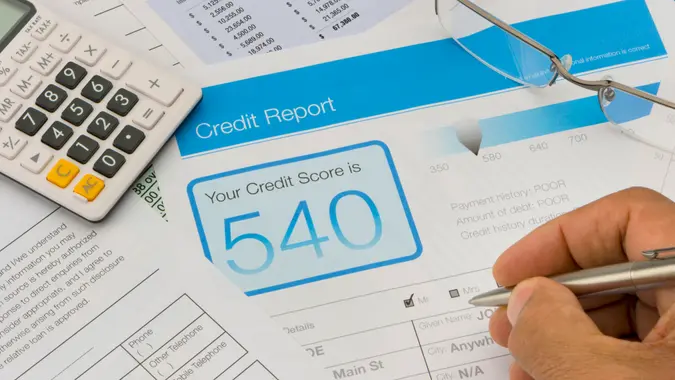How to Repair Your Credit in 6 Easy Steps

Commitment to Our Readers
GOBankingRates' editorial team is committed to bringing you unbiased reviews and information. We use data-driven methodologies to evaluate financial products and services - our reviews and ratings are not influenced by advertisers. You can read more about our editorial guidelines and our products and services review methodology.

20 Years
Helping You Live Richer

Reviewed
by Experts

Trusted by
Millions of Readers
If you’re wondering how to fix your credit fast and boost your score, the good news is that a few smart moves can make a real difference quickly. While there’s no magic button for instant results, paying down credit card balances, disputing errors on your credit report, and making on-time payments going forward can give your score a noticeable lift in just a few weeks. It’s all about showing lenders you’re managing your credit responsibly–starting now.
Step 1: Dispute Errors on Your Credit Report
An investigation by Consumer Reports and Work Money found that 44% of individuals who checked their credit report found a mistake. It is crucial that you check your credit report yearly (at least) and dispute errors on your credit report.
Common credit report mistakes to look for
Here are the common errors you need to watch out for in your credit report:
- Wrong name, address, or Social Security number
- Duplicate accounts
- Accounts that are not yours
- Payments that are marked late but were on time
- Outdated negative items
- Incorrect balances or credit limits
- Fraudulent accounts or identity theft
How to file a dispute with credit bureaus
Once you get your credit report from AnnualCreditReport.com and identify a mistake, you can dispute it with the credit bureaus online or via mail. Here are the links to submit a dispute with the respective credit bureaus: Equifax, Experian and TransUnion.
What to expect during the dispute process
After you file your dispute, you should expect the investigation to take at least 30 days. The bureaus will contact the lender to determine if the information is correct.
You will receive your results via mail or online (depending on how you submitted the dispute). If your disputed information is found to be correct, your report will be updated. If the credit bureau doesn’t find a mistake, you can provide a consumer statement to explain your side.
Step 2: Pay Bills on Time, Every Time
The single most important credit factor is your payment history. It accounts for 35% of your credit score. The following pie chart shows what factors affect your credit score.
Tips for setting up automatic payments or reminders
You don’t have to keep up with payments the hard way. There are things you can do to make it easier on yourself:
- Use your bank or lender’s auto-pay feature. Log in to your bank’s website and enable autopay for recurring payments.
- Choose the right account and payment date. Align your payment dates with the date of your paycheck so you don’t overdraw your account.
- Pay the entire balance. If you can, pay the full balance on your credit cards. If you can’t, at least pay the minimum to preserve your credit score.
Step 3: Reduce Credit Card Balances
Credit card utilization is the amount you owe compared to your credit limit. To bolster your credit score, you want to keep your credit utilization score below 30%. The credit utilization factor contributes to 30% of your credit score, so you want to monitor your credit limit and the amount you owe on a specific card regularly.
Strategies for paying down debt
Ideally, you want a specific strategy to pay down your debt instead of making payments without a plan. You can adopt the snowball method. With this approach, you make payments on the smallest debts first. It builds momentum and is a good psychological win when trying to trim debt.
Alternatively, you could try the avalanche method. This method advocates paying the balance on the debit with the higher interest rate first. It saves money in the long run because you’re not paying off accrued interest plus principal.
Step 4: Avoid New Debt and Hard Inquiries
New credit inquiries can have an impact on your credit score. These inquiries lower your score by five to 10 points. Too many applications at the same time can signal to a lender that you are a credit risk.
Knowing when it truly makes sense to apply for new credit can help protect your score. It’s generally a smart move if you’re preparing for a major purchase, like a mortgage, or if your credit is in great shape and you haven’t applied for anything recently. It’s also a good time to apply when you’re not planning to take out a new mortgage anytime soon, so a small dip from a credit inquiry won’t impact any upcoming loan approvals.
You should wait to apply for new credit when your credit score is recovering or if you’re planning to apply for a major loan soon. It is also a good idea to wait if you applied for credit in the last few months.
Step 5: Negotiate With Creditors
Creditors want you to pay off your debt and are willing to work with you. Here’s the catch — you have to ask for goodwill adjustments. You can call the creditor and explain your situation. If you’re a customer with multiple accounts or have a long-standing good history, the creditor may be willing to remove the negative mark on your payment history.
Setting up payment plans for past-due accounts
You can call the creditor for a hardship payment plan or arrangement. You may be able to lower your interest rate, freeze fees or split the balance into smaller payments. Get any agreement in writing before resuming payments according to the new payment terms.
Step 6: Consider a Secured Credit Card
A secured credit card can help you gain positive momentum in rebuilding your credit. You can make a cash deposit of $200 to $500, which becomes your credit limit. Pay on time and keep your balances low. This activity is reported to the credit bureau.
Another credit-building option is an authorized user account. You can ask a family member to add you to their credit card account. Their credit card history can benefit you if they pay consistently on time.
How Long Does It Take to Repair Credit?
It takes one to three months to make minor improvements to your credit report. A significant improvement on your credit score may take six to 12 months or even longer. The improvement in your credit score depends on the situation.
Here’s how fast different negative marks fall off your credit report:
- Late Payments: Up to seven years
- Collections: Typically seven years
- Hard Inquiries: Two years, but the impact lessens after a few months
- Bankruptcy: Seven to 10 years, depending on the chapter
Should You Use a Credit Repair Service?
Whether you decide to use a credit repair service is an individual decision. Credit repair services are limited. They can offer guidance, communicate with the credit bureaus, and dispute errors on your credit report. They cannot remove negative, accurate information on your credit report. They also cannot guarantee an increase in your credit score.
If you’re able to dispute errors with the credit bureaus, make on-time payments, pay down your debt, and regularly monitor your credit, you can take a DIY approach to credit repair and see meaningful results — no outside help required.
How to avoid credit repair scams
When you contact a company, you may be exposed to credit repair scams. Looking for services compliant with the Credit Repair Organizations Act (CROA) is a good idea. Also, be aware of companies that demand payment up front. It is a scam if they promise to erase bad debt or offer a new identity.
FAQ
- How long does it take to fix credit?
- Moderate improvements can take three to six months; serious issues may take 12 or more months.
- What is the fastest way to repair credit?
- The fastest way to repair credit is to pay down credit card balances, make all payments on time and dispute any errors on your credit report.
- Can I repair my credit myself?
- Yes, you can dispute errors, pay off debts, and build a positive history without a credit repair company.
- Do credit repair companies really work?
- Some may help, but they can charge excess fees for things you can do on your own. The credit repair companies cannot necessarily remove accurate, negative credit information.
- How do I remove negative items from my credit report?
- You can dispute credit inaccuracies with the credit bureaus. Most negative credit information typically stays on your record for seven years, but it can sometimes be removed.
- Will paying off debt improve my credit score?
- Yes, especially when you pay off credit card debt.
- How often should I check my credit report?
- AnnualCreditReport.com offers free credit report checks every year. However, it is recommended that you check your credit report every few months.
 Written by
Written by  Edited by
Edited by 






















